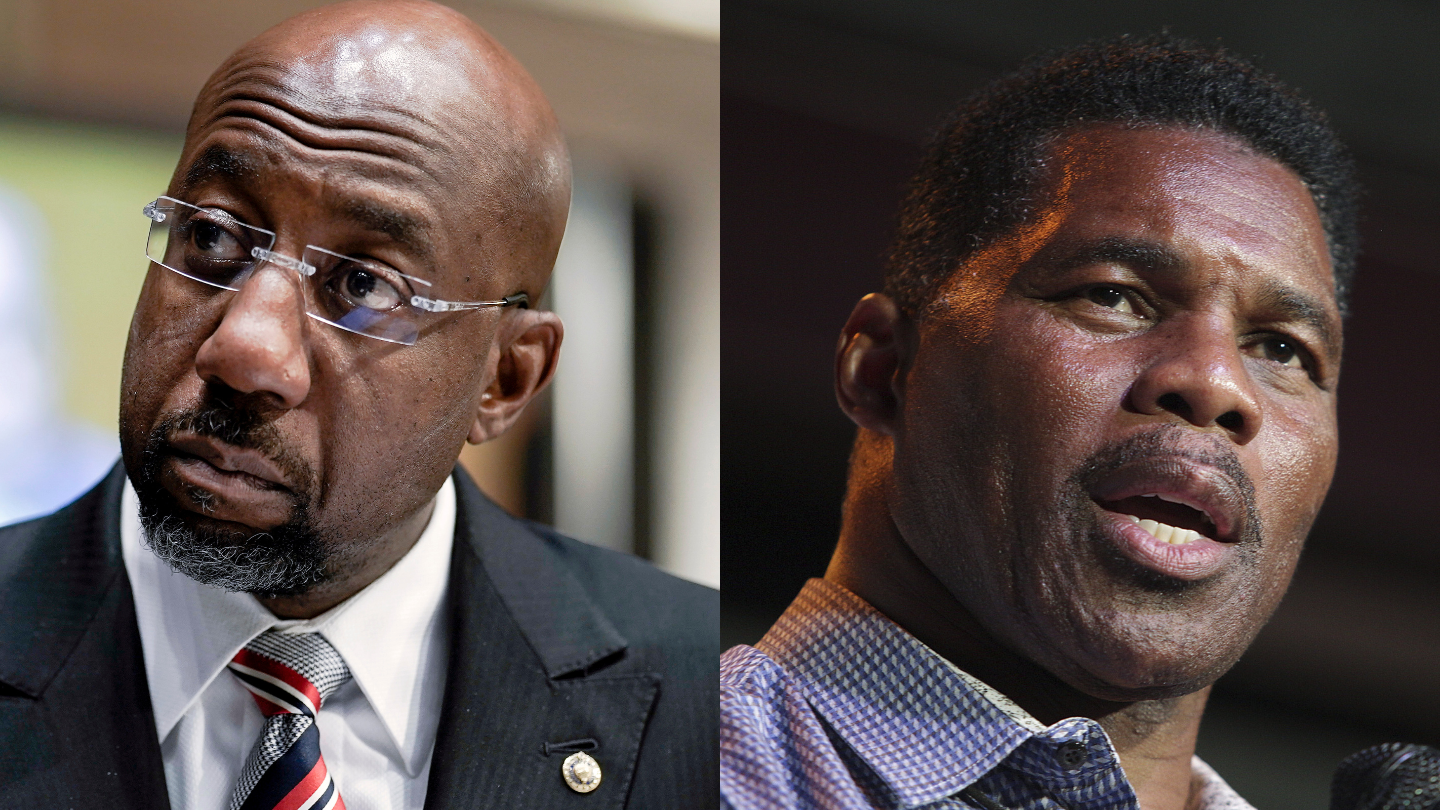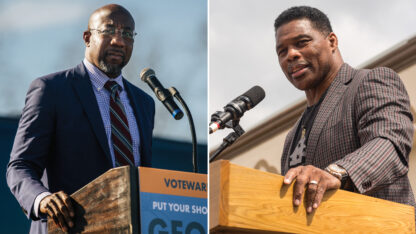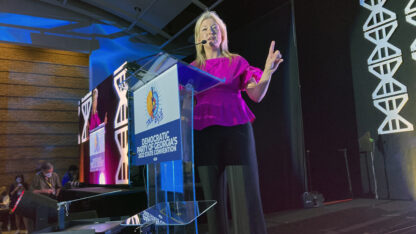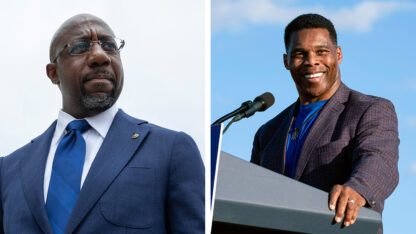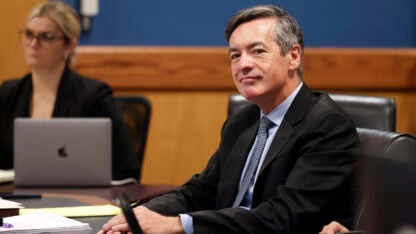Friday’s debate in Savannah between Democratic U.S. Senator Raphael Warnock and Republican challenger Herschel Walker will be the first and likely only time the two candidates meet on a debate stage. The two men are locked in a tight race for one of the most hotly-contested U.S. Senate seats in the country, with Republicans viewing Georgia as a top pickup prospect in the battle for control of the U.S. Senate.
This is also the first time in Georgia history that two Black men are the major party nominees for a Senate seat in Georgia. The debate arrives after a protracted fight between the campaigns over debates. Warnock accepted three debates early in the campaign, while Walker refused to definitively commit to any. Ultimately, Walker accepted a different debate date in Savannah, which Warnock accepted.
Libertarian nominee Chase Oliver has not been invited by the debate organizer, Nexstar.
The debate airs at 7 p.m. Friday night on FOX WAGA-TV in Atlanta.
The WABE Politics Team is your guide for this widely-anticipated debate. Here are five things to watch for:
- How much will Warnock press Walker on his recent controversies — and will Walker be able to effectively respond to the criticism?
Last week, The Daily Beast and The New York Times reported that Walker paid for a woman’s abortion and pressured her to have a second one, despite his vocal opposition as a candidate to abortion without exceptions. WABE and NPR have not independently verified the stories and Walker has denied the stories, though admitting to NBC News that the woman is the mother of one of his children.
Walker has stumbled through his response to the stories so far, but the national party apparatus and Republican base voters appear to be sticking by him. That’s even after Walker’s son Christian unleashed a string of accusations on social media, saying his father was abusive and threatened violence. How will Walker respond when pressed on his sometimes contradictory answers?
Warnock and other Democrats have only commented on the controversy when asked by reporters, and his response has been measured. Will Warnock directly attack Walker over the stories? Or will he leave that to negative advertising that’s been blanketing the airwaves?
- Will debate prep pay off?
During his first run for U.S. Senate in 2020, Warnock appeared in a number of debates, including a high-profile faceoff with then-Sen. Kelly Loeffler. With the balance of power in the Senate at stake, more than 3 million watched the nationally televised debate.
Walker did not appear in any debates in the run-up to the May Republican primary. Back in April, the Atlanta Journal-Constitution reported that Walker had spent time learning policy with U.S. Sens. Lindsey Graham and Ted Cruz, along with former U.S. House Speaker Newt Gringrich.
Democratic Georgia state Rep. Josh McLaurin played former GOP Sen. David Perdue during Democrat Jon Ossoff’s debate prep in 2020.
State Rep. Josh McLaurin on debate prep
McLaurin said if he were playing the role of Walker in debate prep, he’d focus on the unique speaking style of the University of Georgia football legend.
“I would say anybody who wants to recreate Herschel’s presence would try to nail his style more than anything,” McLaurin says. “Some of his public statements have not been the most coherent I think it’s fair to say, and people on both sides would acknowledge that. So I don’t know that you can, with any precision, predict exactly what he’s gonna say.”
But Walker, he said, does have a certain brand of confidence in this race.
“He’s trying to cash in on this former football star, you know, darling of the base type energy and honestly, in some ways that’s not too far off from where David Perdue was.”
- Skilled orator vs. football star
As a pastor, Raphael Warnock knows how to turn a phrase, convey an argument and hold a room. Walker knows this, so his campaign has tried to downplay expectations for him.
“I’m this country boy,” Walker told reporters recently. “You know I’m not that smart. And he’s that preacher. He’s a smart man, wear these nice suits. So he’s going to show up and embarrass me at the debate, October the 14th. I’m just going to show up and I’ll do my best.”
With lower expectations, the thinking goes, it’s easier to claim a win in a political debate.
“Some would say that, well, Herschel Walker is sort of playing with house money because no one has a great deal of expectations,” says Ed Lee, director of debate at Emory University. “And the stakes are so low for him that unless Raphael Warnock does an extremely great job of disqualifying him, then Herschel Walker wins by default.”
But Lee doesn’t necessarily buy that logic and says it could backfire.
“There’s a fundamental difference between managing expectations and forfeiting the game,” Lee says. “To identify that I am not smart, I am not intelligent, really, is to give into the notion that you shouldn’t expect for me to have the capacity to govern, to lead, to engage in politics in the way in which you would expect other people.”
Even if Walker can’t run oratory circles around Warnock, will he be able to stay on message or flounder under the lights? Will either candidate slip up and make a remark that’s easily cut into a negative ad?
- How much will the candidates actually talk about policy?
The U.S. Senate is uniquely positioned to influence American foreign policy because the chamber has to approve diplomats and foreign treaties. It also has influence over the judiciary, as federal judges must get the Senate nod. And of course every other major U.S. policy from the budget to health care comes through the Senate.
It’s likely abortion, the economy and inflation will come up and maybe the war in Ukraine. Warnock proved a pivotal vote in allowing President Joe Biden to pass big chunks of his domestic policy agenda.
The question is whether we will see an actual debate of ideas here or a reverberation of the messages in the candidates’ TV ads.
- Do debates actually matter?
“I think that that’s a question that we should ask,” Lee says.
How much do debates move the needle with voters? Or are they an event viewed mostly by politics nerds like us who want to grab some popcorn and dissect how the candidates performed?
Six percent of Georgia voters have not made up their minds in the Senate race, according to a recent poll by the Georgia News Collaborative, which includes WABE.
Your WABE politics team has also met a handful of independent-minded voters who are still unsure what to make of the controversy surrounding Walker. So it’s possible to imagine this debate in particular being helpful to some voters who are still on the fence about the Senate race.
But Lee says there’s something else that’s important about debates — especially in a moment where candidates have called into question the legitimacy of elections and after allies of former President Trump tried to prevent the peaceful transfer of power following the 2020 election.
“I am one who believes that the rituals and symbols of democracy matter,” he says. “Debates are part of the democratic transition that we have — that two different political actors show up, engage with each other. Part of that engagement is a demonstration of respect, and then at the end of that engagement, to shake their hands and say ‘meet you another day.’ The way in which debates should function is to sow the seeds of civil, civic engagement that allows for the transition of power to take place.”
McLaurin believes there is something to learn about the candidates from debates.
“I think a lot of people are cynical about whether debates matter in general,” he said.
“But I think it’s so vitally important to participate in this process because talking about that clash of styles and presence, people intuitively know when other people are prepared for leadership.”
